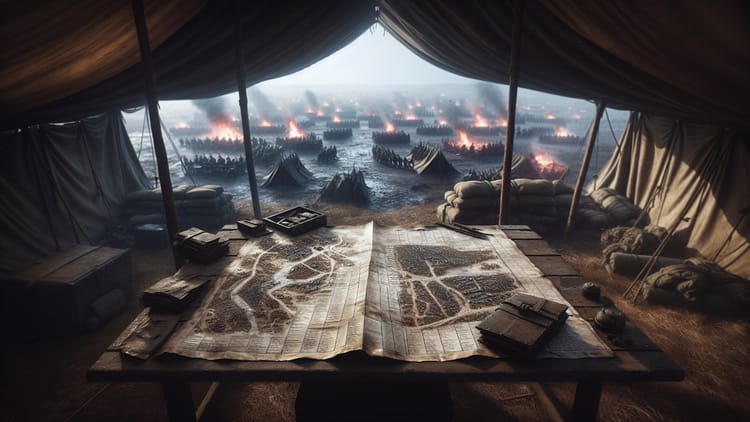Based on a True Story: Act Six (Revelation 5:1-11, 21:1-5)

Big Idea: What keeps us going as we play our part in Act Five? Knowing how the drama ends in Act Six.
Knowing how the drama ends helps us play our part faithfully here and now.
Purpose: To be encouraged by the end of the drama to play our part well.
We’ve been looking at the Bible as a six-act play. Part of the drama is being played here and now. Our job is to improvise our roles faithfully as we wait for the final act of the play.
But I will bet you that you find it hard to maintain intensity as you play your part. The reason? It really looks like we’re playing roles in some other drama than the Biblical one. We understand our role as students, employees, parents. Those seem real. Our role in the theo-drama seems more like an abstraction.
This isn’t a new problem. When Jesus left at the beginning of the book of Acts, it wasn’t hard for the disciples to maintain their intensity. But decades went by, and with every decade it was harder to stay as focused.
By the time Revelation was written, perhaps around 95 AD, it perhaps looked like history was unfolding differently than expected. Persecution was increasing. Focus had been lost. Was it possible still to play one’s role in the theo-drama, or was the whole thing a waste of time?
Today, as well, it looks like things are out of control. This past week, a fourteen-year-old girl was arrested at a nearby school with a loaded Magnum. Police say that gang members are using eight-year-old kids on bikes to run guns. It’s easy to believe that God has lost control.
In this context, Revelation gives us a glimpse of the end of the theo-drama, and reminds us of two things to keep us on track.
One: Jesus is in control
Revelation is sometimes hard to understand, and there are lots of interpretations out there. But it’s important to keep the main message in sight. Arguing over the details is like fighting so much about labor pains that you forget a baby is coming.
John sees a vision of heaven in Revelation 5. The key question in verses 1-3:
Then I saw in the right hand of him who sat on the throne a scroll with writing on both sides and sealed with seven seals. And I saw a mighty angel proclaiming in a loud voice,”Who is worthy to break the seals and open the scroll?" But no one in heaven or on earth or under the earth could open the scroll or even look inside it.
"Who is worthy to break the seals and open the scroll?" The scroll recorded the unfolding of God’s righteous judgments, to set history on its right course. It looked hopeless. If nobody could open the scrolls, then nobody is in charge of guiding history. It’s just random, and our parts don’t matter.
Verse 4:”I wept and wept because no one was found who was worthy to open the scroll or look inside." John is completely discouraged, because it looks like this is the case. History is random; nobody is in control. But then:
Then one of the elders said to me,”Do not weep! See, the Lion of the tribe of Judah, the Root of David, has triumphed. He is able to open the scroll and its seven seals."
Then I saw a Lamb, looking as if it had been slain, standing in the center before the throne, encircled by the four living creatures and the elders. The Lamb had seven horns and seven eyes, which are the seven spirits of God sent out into all the earth. He went and took the scroll from the right hand of him who sat on the throne. And when he had taken it, the four living creatures and the twenty-four elders fell down before the Lamb. Each one had a harp and they were holding golden bowls full of incense, which are the prayers of God’s people. And they sang a new song, saying:
"You are worthy to take the scroll
and to open its seals,
because you were slain,
and with your blood you purchased for God
members of every tribe and language and people and nation.
You have made them to be a kingdom and priests to serve our God,
and they will reign on the earth."
(Revelation 5:5-11)
The lesson: Jesus is in control. We can play our parts faithfully because history isn’t random. Jesus is not just gone. He’s working in history to bring it to its ultimate purpose. Which is:
Two: Everything will be made new
In Revelation 21:1-5, we read where history is headed:
Then I saw”a new heaven and a new earth," for the first heaven and the first earth had passed away, and there was no longer any sea. I saw the Holy City, the new Jerusalem, coming down out of heaven from God, prepared as a bride beautifully dressed for her husband. And I heard a loud voice from the throne saying,”Look! God’s dwelling place is now among the people, and he will dwell with them. They will be his people, and God himself will be with them and be their God. ‘He will wipe every tear from their eyes. There will be no more death’ or mourning or crying or pain, for the old order of things has passed away."
He who was seated on the throne said,”I am making everything new!" Then he said,”Write this down, for these words are trustworthy and true."
This is the biblical hope: not heaven and clouds and harps. We’re mistaken when we think that going to heaven when we die is the point of it all.
The biblical hope is the restoration of all things. Earthly existence is redeemed. God creates a new heaven and a new earth. Cosmic restoration takes place (Colossians 1:19-20).
This is the church’s hope that keeps us playing our part faithfully.
He who testifies to these things says,”Yes, I am coming soon."
Amen. Come, Lord Jesus.
The grace of the Lord Jesus be with God’s people. Amen. (Revelation 22:20-21)





